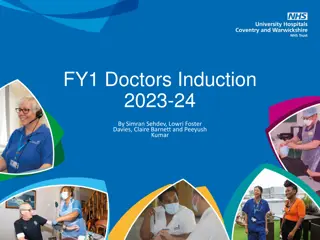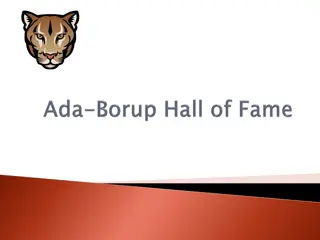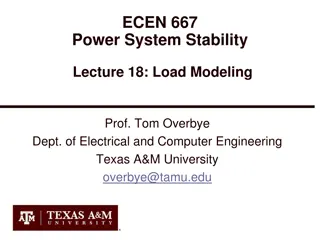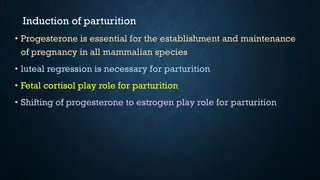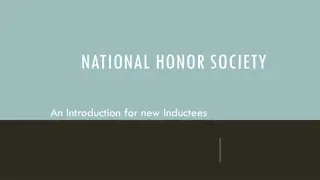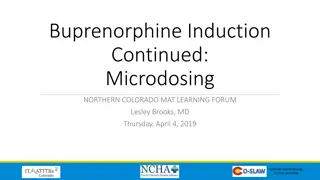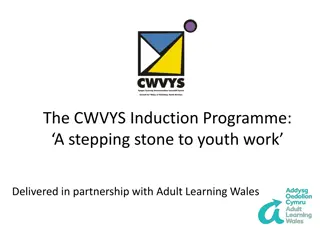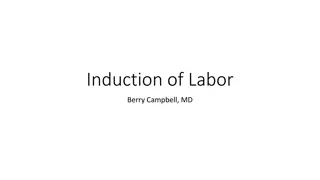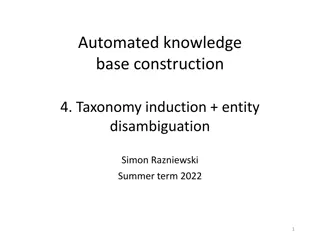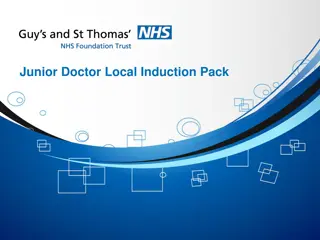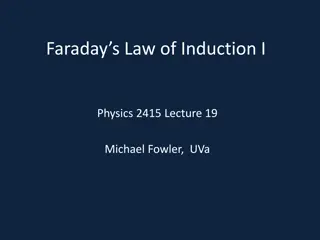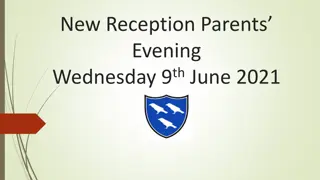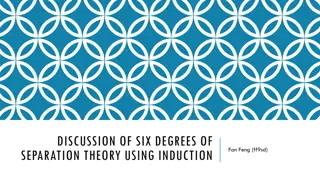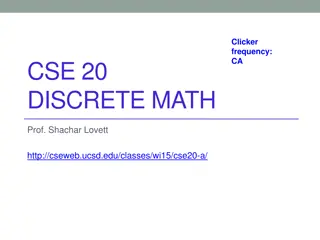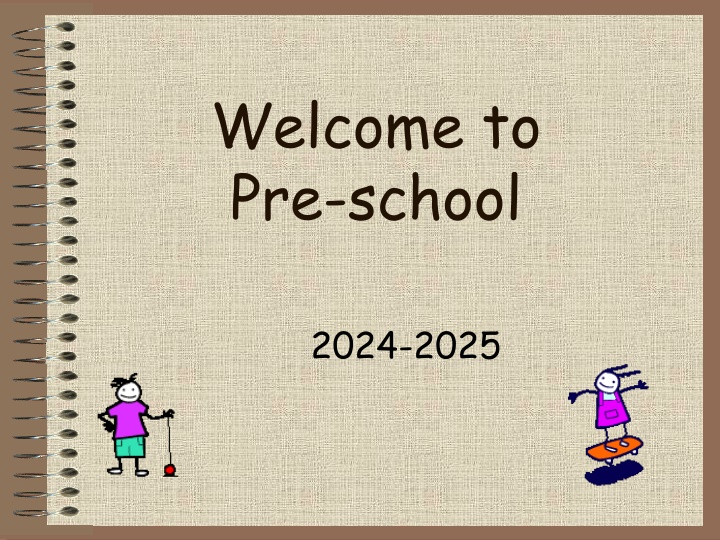
Pre-School Curriculum for Your Child in 2024-2025
Discover the aims of the pre-school curriculum, meet the dedicated staff members, learn about the Early Years Foundation Stage, and explore the key areas of learning and development including personal, social, emotional development, communication, language, and literacy. Find out how your child will be supported in developing essential skills in a playful and active learning environment.
Download Presentation

Please find below an Image/Link to download the presentation.
The content on the website is provided AS IS for your information and personal use only. It may not be sold, licensed, or shared on other websites without obtaining consent from the author. If you encounter any issues during the download, it is possible that the publisher has removed the file from their server.
You are allowed to download the files provided on this website for personal or commercial use, subject to the condition that they are used lawfully. All files are the property of their respective owners.
The content on the website is provided AS IS for your information and personal use only. It may not be sold, licensed, or shared on other websites without obtaining consent from the author.
E N D
Presentation Transcript
Welcome to Pre-school 2024-2025
Aims To help you to understand the curriculum that your child will be covering in Pre- school To understand what we teach in order to cover the requirements of the curriculum To identify the key ways in which you can help your child at home and in school
The Staff Pre-School Class Teachers: Mrs Julie Trillo and Mrs Sharon Chivers Supported by: Mrs Jackie Spilsbury and Mrs Angela Hurdiss
What is the Early Years Foundation Stage? The Early Years Foundation Stage (EYFS) is the stage of education for children from birth to the end of the Reception year It is based on the recognition that children learn best through play and active learning
Within the theme of Learning and Development there are seven areas: 1. Personal, Social and Emotional Development 2. Communication and Language 3. Physical Development 4. Literacy 5. Mathematics 6. Understanding the World 7. Expressive Arts and Design
Personal, Social and Emotional Development The children will be learning to: Select and use activities and resources, with help when needed situations be Spiderman in the game! conflicts Become more outgoing with unfamiliar people and show more confidence in social Play with one or more friends Help to find solutions to conflicts and rivalries learning that not everyone can Follow and understand rules Develop appropriate ways of being assertive and talking to others to solve Talk about feelings Begin to understand how others might be feeling
Communication and Language and Literacy The children will be learning to: Enjoy listening to longer stories and remember much of what happens Use a wider range of vocabulary Understand why questions Sing a large repertoire of songs; Know many rhymes, be able to talk about familiar books and be able to tell a long story Develop communication by using sentences of four to six words Can start conversations with adults or friends and continue it for many turns Use talk to organise themselves and their play
Physical Development The children will be learning to: Develop their movement, balancing, riding and ball skills Control their body using large muscle movements Go up and down stairs using alternate feet Take part in team games Choose their own resources to carry out their own plan Collaborate with friends to manage large items safely
Literacy The children will be learning: About print: print has meaning, print can have different purposes, we read from left to right and from top to bottom, the names of different parts of a book and page sequencing Develop their phonological awareness so they can: spot and suggest rhymes, count or clap syllables in a word, recognise words with the same initial sound Engage in extended conversations about stories, learning new vocabulary Use some of their print and letter knowledge in their early writing Write some or all of their name Write some letters accurately
Mathematics The children will be learning to: Recognise quickly up to 3 objects without having to count them (subitising) Recite numbers past 5 and solve problems with numbers to 5 Say one number for each item in order 1,2,3,4,5 Know that the last number reached when counting a small set of objects tells you how many there are in total (cardinal principle) Compare quantities using language: more than , fewer than, same Talk about and explore 2D and 3D shapes Understand position; describe familiar routes and locations Make comparisons between objects relating to size, length, weight and capacity Talk about and identify patterns around them
Understanding the World The children will explore: Find out about the world around them, asking questions about it Build with different materials, know about everyday technology and learn what it is used for Find out about past events in their lives and their families' lives Find out about different cultures and beliefs
Expressive Arts and Design The children will : Take place in simple pretend play, using an object to represent something else even though they are not similar Make imaginative and complex small worlds with blocks and construction kits Explore different materials freely, developing their own ideas and deciding which materials to use to express them Create closed shapes with continuous lines, and begin to use these shapes to represent objects Draw with increasing complexity and detail Explore colour and colour mixing Listen with increased attention to sounds Listen and respond to what they have heard Remember and sing entire songs, matching pitch and copying melody Play instruments with increasing control to express their feelings and ideas
A typical morning in Pre-school 8.45am 8.50-9.15 9.15-9.30 9.30-11.30 11.30 11.45 11.45 Come in and find peg and name Funky Fingers fine motor skills Register and look at the visual timetable for the morning Activities and teacher focused tasks including snack time Coats/bags/story for home time Going home/lunch Our new academic year starts on Tuesday 3rd September
What can you do to help your childs learning when they begin Pre-school? Sharing books, talking about the pictures Read/share books at least 5 times a week Ongoing-encourage mark making, cards etc Encourage children to talk Practise counting at any time - climbing the stairs, shopping etc Play simple board games, card games Sing number rhymes and songs together Support any homework that comes home, sounds and number work Encourage independence with toileting and dressing
The first few weeks We will find out what the children already know and can do and use this information to help us develop an individual learning programme for each child We keep evidence of the children s learning in our class floor book. This Learning Journey contains samples of work and photographs of what they have been doing You will be invited to discuss how your child has settled in and their progress at parents evenings during the year
Medical Matters Any sickness or diarrhoea must be followed by 48 hours absence Any absence requires a telephone call explaining why to the office by 9.30am Head lice are common! Please check regularly and treat as recommended Any prescribed medicines can only be administered by prior arrangement
Other Matters Uniform Pre-school children do not wear a formal school uniform. Children are encouraged to wear a red hoodie (that can be purchased from School s in uniform shop in Stone) with black or navy leggings/jogging trousers/ trousers/skirts with a white polo shirt. In summer, girls can wear Springfields summer dresses (red/white check) with their hoodie and boys can wear grey/black/blue shorts with a white polo shirt and hoodie. Suitable shoes should also be worn, preferably shoes with velcro not laces Please name every item your child may take off including shoes! Bring a pair of named wellingtons to be left at school Please have a coat in school every day Sun cream needs to be applied at home before Pre-school and sun hats are needed in warm weather
And Finally If you have any worries or concerns please email our Pre-school staff via the school office and we will do our best to help you (office@springfields- first.staffs.sch.uk) PLEASE READ THROUGH OUR WELCOME PACK FOR MORE DETAILS OF LIFE IN PRE-SCHOOL



